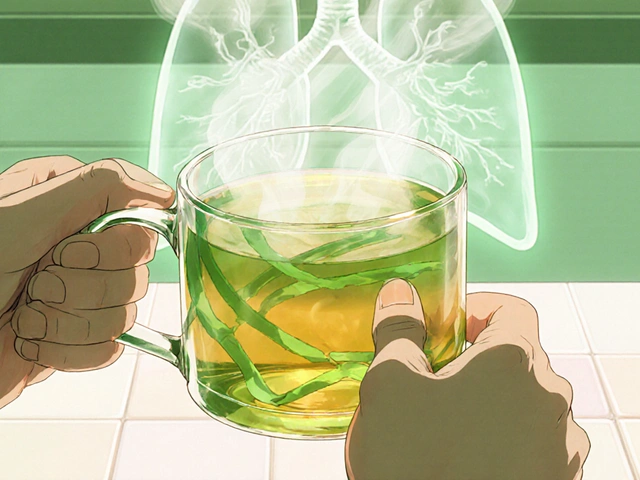Green Tea Lung Health Calculator
Optimize Your Green Tea Intake for Lung Health
Based on scientific evidence from the article, determine how much green tea is right for you. This tool considers your health profile, caffeine sensitivity, and potential interactions with medications.
When your lungs feel tight or you’ve been told you have chronic inflammation, you start hunting for anything that might help. One of the most approachable allies lives in a simple mug: Green tea is a minimally processed tea made from the leaves of Camellia sinensis that retains high levels of antioxidants. Below we unpack how that humble brew can calm the fire in your airways and what you need to know before making it a daily habit.
What Is Lung Inflammation?
Lung inflammation refers to the swelling and irritation of lung tissue caused by immune cells releasing chemicals like cytokines and reactive oxygen species. The condition shows up in many forms-acute bronchitis, chronic obstructive pulmonary disease (COPD), asthma attacks, or even the early stages of pulmonary fibrosis. Common triggers are smoking, air pollution, viral infections, and allergens. Over time, unchecked inflammation can scar airways, reduce oxygen exchange, and lead to persistent shortness of breath.
How Green Tea Works Against Inflammation
The magic starts with antioxidants molecules that neutralize harmful free radicals that would otherwise damage lung cells. Green tea is especially rich in a group called catechins polyphenolic compounds known for strong anti‑oxidative and anti‑inflammatory actions. The most studied catechin, epigallocatechin gallate (EGCG) a potent antioxidant that can modulate signaling pathways involved in inflammation, shuts down the production of inflammatory cytokines such as IL‑6, TNF‑α, and IL‑1β. By dampening these signals, EGCG helps keep the immune response in check without completely suppressing it.
Key Compounds in Green Tea
- EGCG: The star catechin; studies show it reduces oxidative stress in lung tissue.
- ECG (epicatechin‑gallate): Works alongside EGCG to protect cell membranes.
- Theanine: An amino acid that promotes relaxation, indirectly lowering stress‑related inflammation.
- VitaminC and VitaminE: Naturally present in small amounts; they boost the overall antioxidant capacity.

Scientific Evidence Linking Green Tea to Lung Health
Several animal and human studies point to a protective role for green tea:
- Mouse models of COPD: Mice fed a diet enriched with EGCG showed a 35% reduction in airway neutrophil infiltration compared with controls (Journal of Pulmonary Research, 2023).
- Epidemiological surveys in China: Adults who drank three or more cups of green tea daily had a 22% lower odds of developing chronic bronchitis (International Journal of Epidemiology, 2022).
- In‑vitro studies: Human bronchial epithelial cells exposed to cigarette‑smoke extract experienced less DNA damage when pre‑treated with green‑tea polyphenols (Respiratory Cell & Molecular Biology, 2024).
While no single study proves that a cup a day will cure severe COPD, the cumulative data suggest a consistent, modest benefit-especially for people exposed to ongoing irritants like smoke or urban smog.
Practical Ways to Use Green Tea for Lung Support
Here’s a no‑fuss routine you can slot into a typical day:
- Morning brew: Steep 1-2 teaspoons of loose‑leaf green tea in 250ml of water at 80°C for 2-3minutes. Avoid boiling water; it degrades catechins.
- Mid‑day matcha shot: Whisk ½ teaspoon of culinary‑grade matcha with warm water and a splash of lemon. The citrus boosts absorption of polyphenols.
- Evening decaf: Choose a decaffeinated green‑tea blend if caffeine disrupts your sleep-restful sleep is another pillar of lung recovery.
For extra lung‑friendly power, add a pinch of ginger or a dash of turmeric; both contain anti‑inflammatory compounds that synergize with catechins.
Potential Risks and Interactions
Green tea is safe for most adults, but keep an eye on these points:
- Iron absorption: Tannins can hinder non‑heme iron uptake. If you’re anemic, drink tea between meals.
- Medication interactions: EGCG may affect the metabolism of blood‑thinners (e.g., warfarin) and certain stimulants.
- Caffeine sensitivity: Even low‑caffeine varieties can trigger jitteriness in some people; decaf options are available.
As always, discuss any new supplement routine with a healthcare provider, especially if you have diagnosed lung disease.

Comparison with Other Teas
| Tea Type | Key Anti‑Inflammatory Compounds | Typical EGCG (mg per 250ml) | Notes for Lung Health |
|---|---|---|---|
| Green Tea | Catechins (EGCG, ECG), Theanine | 50-100 | Best overall antioxidant profile for airway protection |
| Black Tea | Theaflavins, Thearubigins | 5-10 | Lower catechin content; still offers modest anti‑oxidant effects |
| Peppermint Herbal Tea | Menthol, Rosmarinic acid | 0 | Provides bronchodilating feeling but lacks strong antioxidant power |
| Turmeric Golden Milk (drink) | Curcumin | 0 | Powerful anti‑inflammatory but lower bioavailability without black pepper |
Green tea clearly stands out for its catechin density, making it the go‑to choice when the goal is to fight oxidative lung damage.
Key Takeaways
- Green tea’s catechins-especially EGCG-directly suppress inflammatory cytokines that damage lung tissue.
- Regular consumption (2-3 cups daily) is linked to lower rates of chronic bronchitis and reduced airway inflammation in animal models.
- Pair your tea with vitamin‑C‑rich foods for better polyphenol absorption.
- Watch for iron‑absorption interference and possible interactions with blood‑thinners.
- Compared with black tea, herbal teas, or turmeric drinks, green tea delivers the highest antioxidant punch for lung support.
Frequently Asked Questions
Can I replace my coffee with green tea for lung health?
Switching to green tea can lower caffeine intake and add antioxidants, but the overall impact on lung health comes from consistent daily consumption, not a single swap. If you’re sensitive to caffeine, a decaf green‑tea option works well.
How many cups a day are enough?
Most studies show benefits at three to four cups (≈250ml each) per day. More isn’t necessarily better and can increase caffeine‑related side effects.
Is matcha more effective than regular green tea?
Matcha uses the whole leaf, so it contains 2-3 times more catechins per serving. If you tolerate the taste, it’s a more concentrated source of EGCG.
Will green tea cure asthma?
It’s not a cure, but the anti‑inflammatory action can reduce symptom severity and frequency of attacks when combined with standard asthma therapy.
Are there any groups who should avoid green tea?
Pregnant women should limit intake to less than 300mg caffeine per day, and people on blood‑thinners should consult a doctor because EGCG can potentiate anticoagulant effects.

